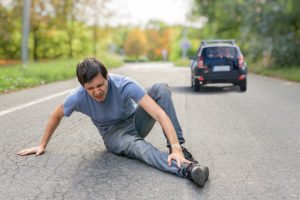
1. What are my legal duties after a car accident in Denver Colorado?
If you are involved in a car accident in Denver, Colorado, you must stop and trade insurance information and contact information with the other driver(s), pedestrian(s), or bicyclist(s). Otherwise, you face hit and run charges.
If someone is injured in the accident, you should – if possible – offer reasonable assistance such as calling an ambulance.
If you hit an unattended car, you are required to stop and find the car owner/operator or else attach a note with your name, address, and car registration information.
Finally, if the accident causes injury or property damage, you must file an accident report with the DMV unless police officers with the Denver Police Department are present at the scene.1
2. What are the Denver hit and run penalties?
Fleeing after hitting an occupied vehicle – but causing no injury – in Denver, Colorado is a class 2 misdemeanor traffic offense. Penalties include:
- 10 to 90 days in jail, and/or
- A fine of $150 to $300.
But if someone sustains a non-serious injury, then hit and run is a class 1 traffic misdemeanor. Punishments include:
- 10 days to one year in jail, and/or
- A fine of $300 to $1,000.
If the accident causes a serious bodily injury, then hit and run is a class 4 felony. The sentence for this type of felony hit-and-run (CRS 42-4-1603) is:
- 2 to 6 years in prison, and/or
- A fine of $2,000 to $500,000.
If the accident causes a fatality, then hit and run is a class 3 felony. The penalties are:
- 4 to 12 years in prison, and/or
- A fine of $3,000 to $750,000.
Finally, fleeing after hitting an unoccupied motor vehicle that results in property damage is a class 2 misdemeanor traffic offense. The punishment is:
- 10 to 90 days in jail, and/or
- A fine of $150 to $300.2
3. How long do prosecutors have to bring charges?
Even if the at-fault motorist in a hit-and-run crash successfully escapes, chances are the Denver police will find them with the help of traffic cameras and eyewitness accounts.
The statute of limitations for bringing criminal charges turns on the seriousness of the case:
|
Colorado hit-and-run crime |
Statute of limitations for bringing criminal charges |
| Class 3 felony (fatal accidents) and vehicular homicide (CRS 18-3-1-6) together | 10 years after the accident |
| Class 3 felony (causing a fatality) | 5 years after the accident |
| Class 4 felony (causing serious but non-fatal injuries) | 3 years after the accident |
| Traffic misdemeanors (all other hit-and-run cases) | 1 year after the accident |
After the applicable time period has passed, the D.A. may no longer bring criminal charges.3
4. How do I fight Denver hit and run charges?
Five potential defenses to Colorado charges of fleeing the scene of an accident are:
- You were too injured to stay at the scene of the car crash and/or report the accident to police.
- You honestly did not realize you had hit anyone.
- You honestly did not know that anyone was harmed or that any property was damaged.
- The only reason you left the scene of the accident was to find law enforcement officers or to help an injured victim.
- No injury or property damage occurred.
See our related article, Denver Hit and Run – 5 key things to know.

Hit and run with only property damage is a misdemeanor in Denver.
Arrested for a Denver hit-and-run accident? Our Colorado law firm fights to get your charges reduced or dismissed while saving your driver’s license.
Our DUI/criminal defense attorneys offer legal advice in Denver, Aurora, Arvada, Adams County, Boulder County, Jefferson County, Lakewood, Westminster, and throughout the state of Colorado. Call to make an appointment with us at our Denver office, our Colorado Springs law office, or our Loveland law office.
And if you are a victim of a hit and run driver, contact our Denver CO personal injury lawyers. Our accident attorneys aggressively negotiate with the insurance companies in pursuit of the largest settlement possible to cover all of your medical bills, lost wages, and pain and suffering.
Legal References
- Colorado Revised Statutes 42-4-1603. CRS 42-4-1606. See also People v. Medrano-Bustamante, 2013 COA 139, 412 P.3d 581; see also People v. Hernandez, 250 P.3d 568 (Colo. 2010).
- CRS 42-4-1601 (4)(a). CRS 42-4-1602. CRS 18-1.3-401. CRS 42-4-1601 (4)(b). CRS 42-4-1701 (3)(a)(II)(A).
- CRS 16-5-401.

